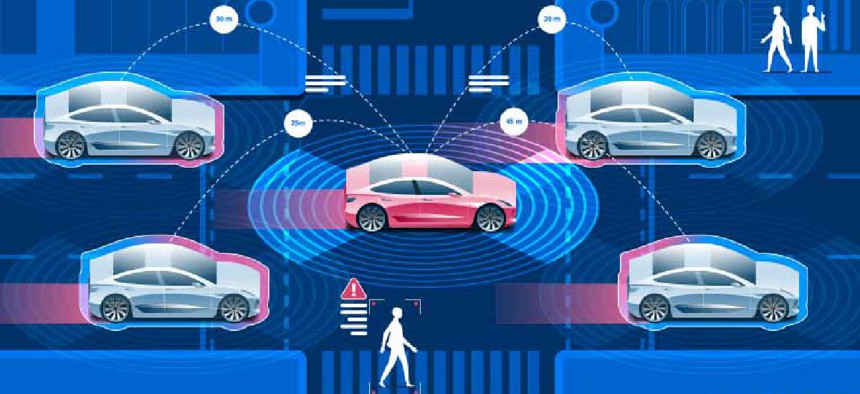Connecting state and local government leaders
Researchers have developed a framework to identify the public health effects of self-driving vehicles.
Autonomous vehicles (AVs) are the wave of the future in the automobile industry, and there’s extensive discussion about the impacts on transportation, society, the economy, and the environment.
Less attention, however, has been focused on the potential health impacts of self-driving vehicles.
To address that gap, researchers developed a conceptual model to identify these health impacts systematically. They identified 32 transportation-related risk factors that affected health, and concluded that 17 could negatively affect public health, while eight could have a positive impact. There were seven areas of uncertain implications that require further investigation.
The findings appear in Sustainable Cities and Society.
“A survey on the receptiveness of autonomous vehicles’ impacts showed that there is a lack of awareness of the potential health impacts of AVs and low perceptions of the importance of AV health benefits,” says Soheil Sohrabi, a doctoral student in the civil and environmental engineering department and a graduate researcher at the Texas A&M Transportation Institute (TTI).
“On the other hand, there are some unintended consequences of AVs’ implementation that need to be studied before AVs find their way onto the road.”
The researchers created a conceptual model to systematically identify the pathways through which AVs can affect public health. The proposed model summarizes the potential changes in transportation after AV implementation into seven points of impact: transportation infrastructure; land use and the built environment; traffic flow; transportation mode choice; transportation equity; and jobs related to transportation and traffic safety. The changes in transportation are then attributed to potential health impacts.
In optimistic views, AVs are expected to prevent 94% of traffic crashes by eliminating driver error, but AVs’ operation introduces new safety issues such as the potential of malfunctioning sensors in detecting objects (pedestrians, bikes and cyclists, vehicles, obstacles, etc.), misinterpretation of data, and poorly executed responses, which can jeopardize the reliability of AVs and cause serious safety consequences in an automated environment.
Another possible safety consideration is the riskier behavior of users because of their overreliance on AVs—for example, neglecting the use of seatbelts due to an increased false sense of safety.
AVs have the potential to shift people from public transportation and active transportation such as walking and biking to private vehicles in urban areas, which can result in more air pollution and greenhouse gas emissions and create the potential loss of driving jobs for those in the public transit or freight transport industries.
The model serves researchers in the fields of transportation engineering and urban planning, as well as automotive makers, health sectors, and policymakers to identify the potential pathways through which AVs can affect public health, and to investigate the impacts, quantify them, and develop policies to mitigate them.
“Given the very fast-paced research related to AVs, this work provides very good preliminary guidelines about how AVs can negatively and positively affect the general health of people before their full deployment,” says Dominque Lord, professor of civil and environmental engineering.
“Hence, engineers, planners, and policymakers can already examine measures and policies that could mitigate the negative health effects.”
“This study can urge public health sectors to enter the discussion about AVs and contribute to supporting policies that address the potential negative impacts,” Sohrabi says.
“It also increases the public awareness of the health impacts of AVs that can facilitate the acceptance of AV regulations and motivate them to use this new technology and ultimately, benefit the greater good.”
In the future, Sohrabi says more research is needed to clarify public health impacts of AVs more accurately. This study was primarily focused on urban areas and does not take into account the affects of AVs in rural areas.
“The discussion about the health implications of AVs is new and limited,” he says. “Next, we will be working on quantifying the health implications of AVs.”
This article was posted from Futurity.
NEXT STORY: Using AVs to tell friend from foe



